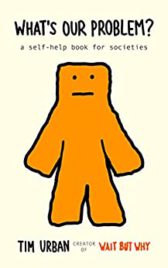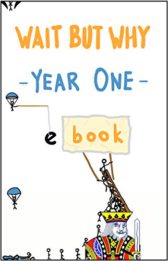Tim Urban’s “Thinking Ladder” and the concept of “High-Rung Thinking” are integral to his most recent book, What’s Our Problem?: A Self-Help Book for Societies....
Tim Urban’s “Thinking Ladder” and the concept of “High-Rung Thinking” are integral to his most recent book, What’s Our Problem?: A Self-Help Book for Societies. But way before the book, his articles on the subject captured the attention of business leaders such as Tobi Lütke, the CEO of Shopify, who believed they held critical lessons for teams and leaders. In fact, Lütke was such a fan of Tim’s ideas that he bound the articles into booklets for his entire company to read.
In a world where we mostly focus on what we think, The Thinking Ladder is a how you think axis. Up on the high rungs of the Ladder, we’re open-minded and geared towards truth. When we drift down to the low rungs, we begin to identify with our ideas, become reluctant to changing our minds, and learning stalls. The Thinking Ladder is an intuitive tool that fosters innovation and creativity and sparks powerful insights relevant to corporate culture, managing teams, motivation, and customers—along with healing and hopeful insights into the most pressing issues facing society today.
In this mindset-shifting talk, Tim explores how individuals think, how groups think together, and how those two things are connected. Using his trademark drawings, Tim explains the Thinking Ladder and its four types of thinking: “The Scientist” and “The Sports Fan,” who keep their thinking on the high rungs of the ladder; and “The Attorney” and “The Zealot,” who occupy the lower rungs, susceptible to dogma and stuck in outdated ideas. He explains why “high-rung thinking” is better suited to innovation and teamwork.
He also applies the Thinking Ladder to groups and introduces audiences to two broad kinds of intellectual and workplace culture: The Idea Lab, a “high-rung” culture where disagreement is encouraged, where people are always respected, but ideas are not; and The Echo Chamber, a “low-rung” culture that penalizes departure from the prevailing narratives at the company and incentivizes independent minds to remain silent. While Idea Lab culture unleashes the full intellectual power of a group of minds and gives the company a superbrain, Echo Chamber culture leaves that potential untapped—the company brain is simply the brain of the CEO, widely repeated.
This keynote will immediately impact how you perceive, respond to, and strategize about just about everything. Tim’s inspiring guidance helps people stay on the highest rungs of their own ladder and rethink the way that they think—with transformational results. His frameworks for thinking and collaboration are catchy and memorable, and audiences will be using them years after hearing the talk.

